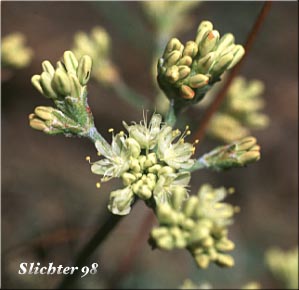

Strict buckwheat is a mat forming subshrub to 60 cm tall. The woody stems are prostrate to ascending. The flower stems are leafless above the basal leaves, although a pair of tiny bracts may be found at the point where the stem branches into the inflorescence. The leaves are mostly basal, with the blades oval to ovate in shape tapering abruptly to long, thin petioles which are 1-4 times longer than the blade.. The leaves range from 5-25 mm long and the lower blade surface is gray-woolly, the upper surface being gray to green, either woolly to sparsely haired.
The inflorescence is open and two to three branched, subtended by 2 linear bracts. The involucres are tubular and bell-shaped and range from 3-5 mm long. Five short, erect triangular teeth are found at the distal end of the involucral tube. The flowers are typically white, creamy, or occasionally yellow as in the variety anserinum shown above. The individual flowers range from 3-4 mm long and lack hairs on their outer surfaces.
variety anserinum : Involucres tomentose. If glabrous, the involucres are congested. Leaves grayish on both surfaces. Flowers yellow. Found along the east base of the Cascade Mts from Chelan County, Washington south to south-central and southeastern Oregon, northeastern California and Nevada.
variety glabrum : Involucres congested and mostly glabrous. Leaves grayish on both surfaces. Flowers white or cream. Found from Yakima, west Grant, and Douglas Counties in Washington.
variety proliferum : Involucres floccose to tomentose and congested. Flowers white or cream. Leaves grayish on both surfaces. Found across the range of the species but less common within the range of the above varieties.
variety strictum : Involucres solitary and glabrous. Open inflorescence. Leaf blades greenish above, elliptic to ovate-elliptic inshape, and 1-2 cm long. Petioles 2-4 longer than blade. Flowers white, cream, light yellow or pink. Found in the Blue Mts. and Wallowa Mts. of southeastern Washington and northeastern Oregon and west-central Idaho.
Found in both Ponderosa Pine forests and sagebrush, on sandy or gravelly soil.
A widespread species, found from north-central Washington east to Idaho and western Montana, south to Nevada, then west to the east slopes of the Sierra of northern California and Cascades of the Pacific Northwest.